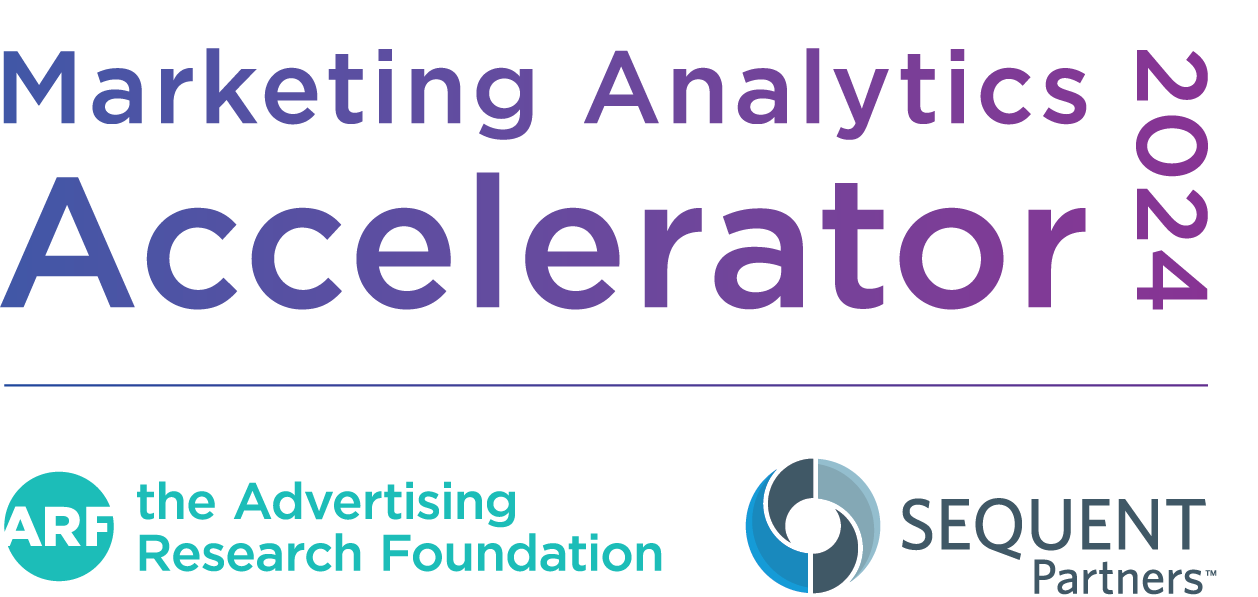| 8:00 – 9:00am | Registration and Breakfast |
| 9:00 – 10:40am | Morning Section Measuring and Optimizing Creative In-Market Performance |
| 9:00 – 9:05am | Opening Remarks
Sequent Partners |
| 9:05 – 9:20am | Shifting the Paradigm of Addressability and Utilizing Measurement as a Planning Roadmap
Neil Napolitano – Executive Director of Measurement Innovation, Dotdash Meredith |
| 9:20 – 9:35am | Pioneering the Integration of Creative Quality into Marketing Measurement
Understanding and measuring media creative effectiveness in a repeatable and scalable manner, for inclusion into MMMs.
Alex Fitzgerald – Program Lead– Data Science & Marketing, Ekimetrics
Marta Martinez – Managing Director of Data, Measurement and Analytics, Google |
| 9:35 – 9:50am | Ad Testing Breakthrough: AI Amplifies the Voice of Humans
Fast and cost-effective copy testing that combines AI models and human input to deliver more accurate results.
Tina DeSarno – SVP and Head of Ad Solutions, MarketCast
Stephanie Lancaster – Manager, Consumer Insights, Wendy’s |
| 9:50 – 10:05am | The New Era of Storytelling: How AI Enables a New View on
Ways Creative Drives Media Impact
Leaders only investing in generative AI as opposed to other AI-applications, are losing the opportunity to drive a scaled insights and learning agenda.
Rebecca Dykema – SVP Partnerships and Creative Transformation, CreativeX
Shekhar Deshpande – Head of Strategy, Global Clients, Meta
Abhishek Jadon – VP, Global Media Transformation, Pepsi
Shardul Wartikar – VP Analytics, Kantar |
| 10:05 – 10:20am | Attribution at the Edge: Delivering Causal Analysis at
Scale for Rapid Business Outcomes Measurement
Adam Waszczak, Ph.D. – VP of Data Engineering & Operations, 605 an iSpot company |
| 10:20 – 10:40am | Panel Discussion with Section Speakers
Panel Moderator: George Musi – Chief Business Officer, Night Market |
| 10:40 – 11:10am | Morning Break |
| 11:10am – 12:30pm | Mid-Morning Section Overcoming Data Challenges with Innovative Data Solutions |
| 11:10 – 11:25am | Mastering the Micro-Moment: Unleashing Short-Form Content’s Power in Digital Consumer Journeys
New strategies to optimize audience engagement across platforms and synergies to drive growth across units.
Natasha Hritzuk – VP, WBD Corporate Research
Liz Huszarik – Co-Founder, Maverix Insights |
| 11:25 – 11:40am | First-to-Market Holistic Radio Measurement
That which cannot be measured should not be bought. But what if it works and just can’t be measured?
Curtis Corl – CMO of Ocean State Job Lot
Jenna Umbrianna – Chief Development Officer of Mediastruction |
| 11:40 – 11:55am | Touchpoint Analytics: Bootstrapping MMM/ MTA with Practical Research Insights to Fill Data Gaps
A practical approach using complementary assessments that can provide insights rather than accept missing data that may bias results.
Bridget Nelson – Head of Brand Performance and Audience Research, MassMutual
Mike Griffin – VP of Client Service, Kantar |
| 11:55am – 12:10pm | Your Brand Deserves Better, Leveraging MMM to Solve the Brand vs. Performance Dilemma
Learn how Transunion leveraged its MMM capabilities to properly evaluate the short and longtail impact of brand media on Snapchat.
Colin Duethorn– Group Manager, Revenue Partnerships, Research & Insights, Snapchat
Michael Sagristano – Director, Marketing Solutions TransUnion
|
| 12:10 – 12:30pm | Panel Discussion with Section Speakers
Panel Moderator: Michael Kaushansky – Product Management, Measurement & Data, Walmart |
| 12:30 -1:30pm | Lunch |
| 1:30 – 2:50pm | Early Afternoon MMM: Matching the Complexity of the Marketplace |
| 1:30 – 1:45pm | Goodbye Misleading Metrics: Using Commercial Analytics for Growth
Why Commercial Analytics can integrate diverse metrics, understand cross-channel impacts, and make data-driven decisions that drive business growth.
Laura Guerin – Sr. Director, Consumer Analytics, SharkNinja
Mike Menkes – VP of Customer Engagement, Analytic Partners |
| 1:45 – 2:00pm | How Brands can Drive 5% Sales Lift Through Synthetic Attention
A prediction system that instantly scores ad attention and delivers recommendations.
Johanna Welch – Global Mars Horizon Comms Lab Associate Director, Mars
Max Kalehoff – Chief Growth Officer, Realeyes |
| 2:00 – 2:15pm | The Awareness Advantage: Why Brand Building Drives More Effective Performance Advertising on TikTok
How stronger brand awareness drives greater effectiveness in marketing performance.
Caroline Gardner – Head of Integrated Brand Marketing & Experience at The RealReal
Leanne Tomasevic – US & UK Head of Insights, Tracksuit |
| 2:15 – 2:30pm | Navigating the Journey from Integrated Strategic Planning to Tactical Optimization
How causal AI with deep learning empowers agile and effective marketing planning driving revenue growth.
Bharath Gaddam – Founder, DataPOEM |
| 2:30 – 2:50pm | Panel Discussion with Section Speakers
Panel Moderator: Andy Fisher – Head of Merkury Advanced TV, Merkle |
| 2:50-3:20pm | Afternoon Break |
| 3:20-4:50pm | Late Afternoon Is AI Transforming Marketing Analytics? |
| 3:20 – 3:35pm | From Data to Dollars: How Shiseido Leveraged Machine Learning to Create Meaningful Customer Experiences
Practical steps for using machine learning to analyze online user behavior and pinpoint online customers with high lifetime value.
Omer Iqbal – SVP, Digital and Technology, Shiseido Company Limited
Rodolphe Dougoud – Project Lead, Fifty-Five |
| 3:35 – 3:50pm | Using Daily, Campaign-Level Insights to Maximize ROAS with Machine Learning MMM
Using AI-powered MMM to eliminate last-click bias and forecast profitability of future spend across all advertising campaigns.
Cameron Bush – Head of Advertising, HexClad
Michael True – Co-Founder and CEO, Prescient AI |
| 3:50 – 4:05pm | GenAI Delivers the Next Generation of Multitouch Attribution
How Gen AI has remarkable predictive power based on customers interaction history.
Steve Cohen – Partner, In4mation Insights
John Fix – Consultant, John Fix Ltd |
| 4:05 – 4:20pm | Maximizing the Accuracy of Full Funnel Cross-Media Outcomes Measurement
Learning how Nielsen ONE can optimize short term sales and brand growth.
Kristin Vento – SVP, Nielsen
Adam Isselbacher – SVP, Group Director, Research & Analytics, IPG |
| 4:20 – 4:40pm | Panel Discussion with Section Speakers
Panel Moderator: Corina Constantin – Global Head, Campaign Analytics, Essence Mediacom
|
| 4:40-4:50pm | Closing Remarks
Sequent Partners |
| 4:50-5:00pm | Closing Remarks
Mike Menkes – VP of Customer Engagement, Analytic Partners |
| 5:00-7:00pm | Cocktail Reception |


























